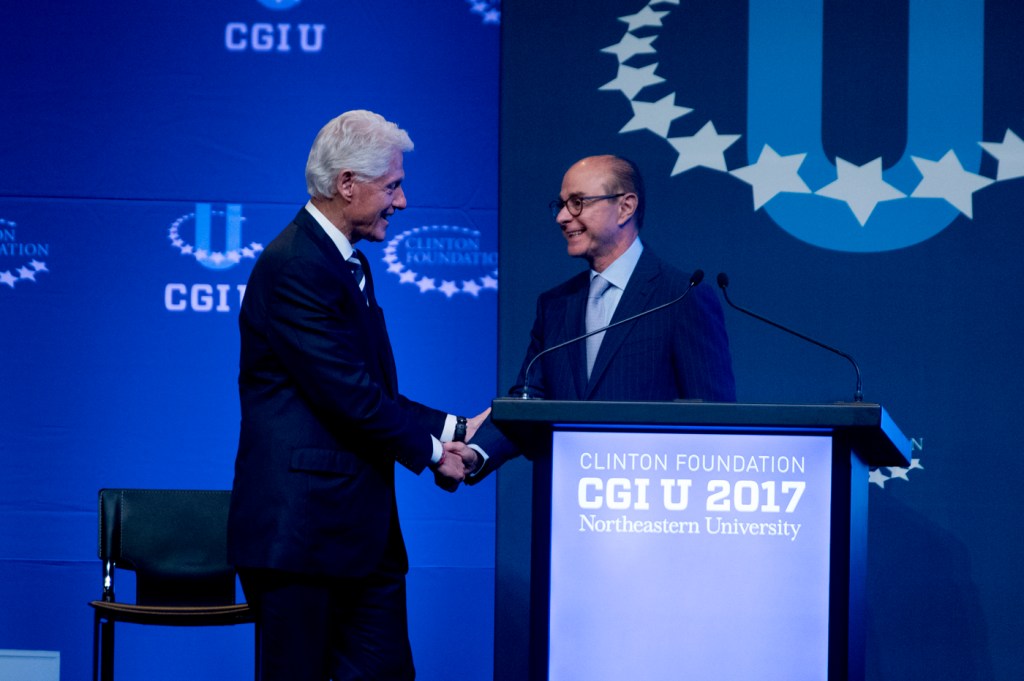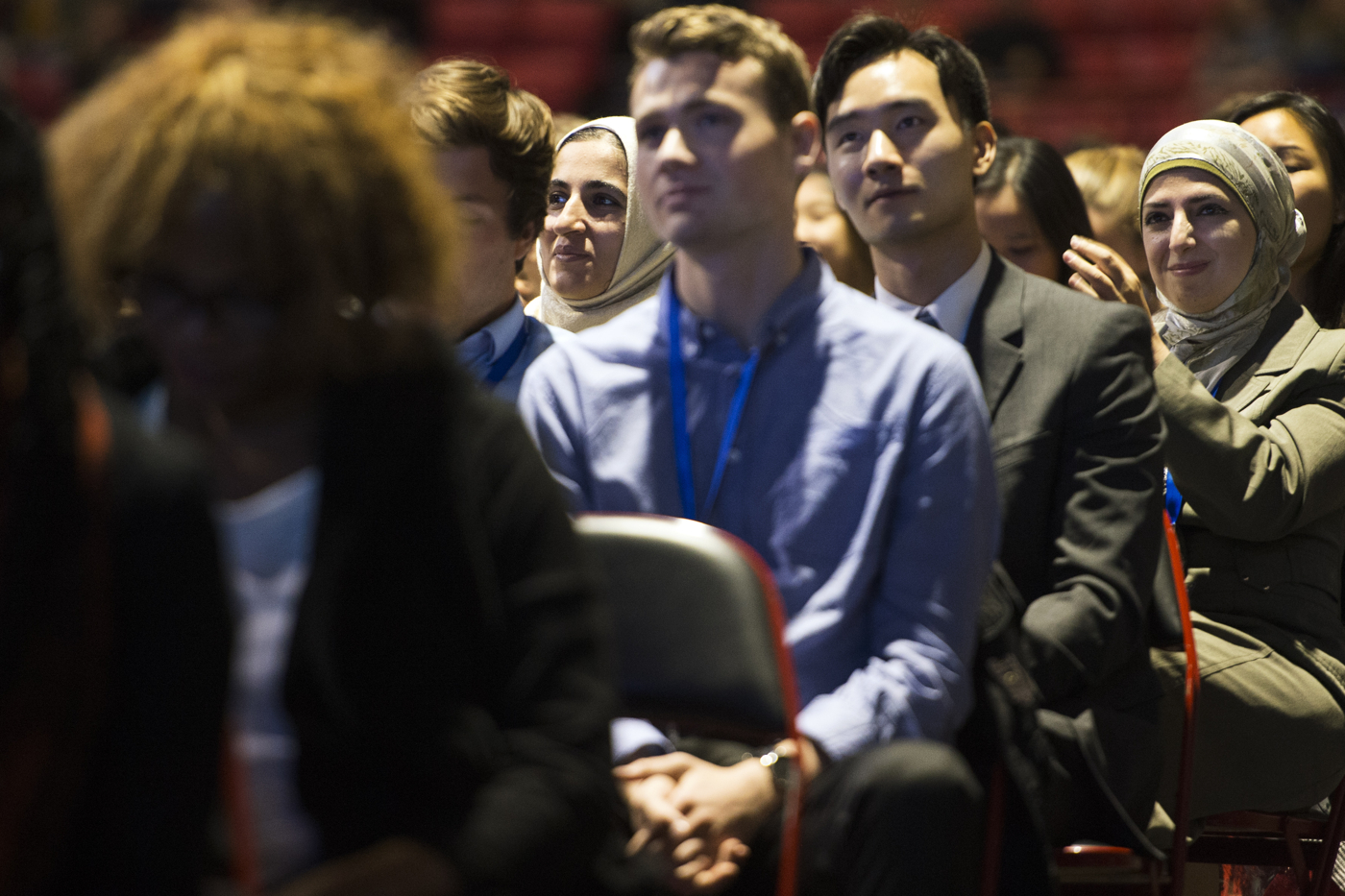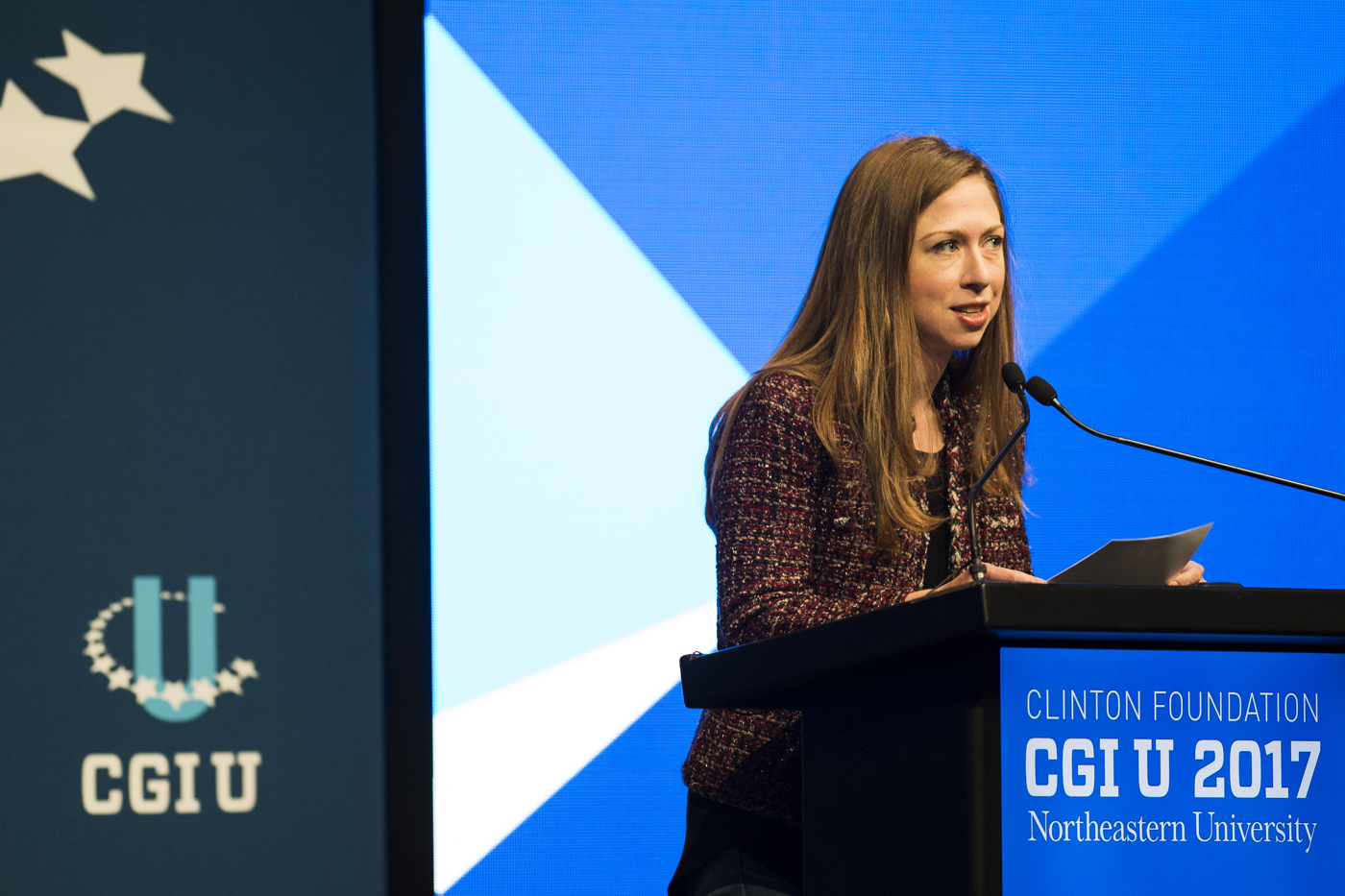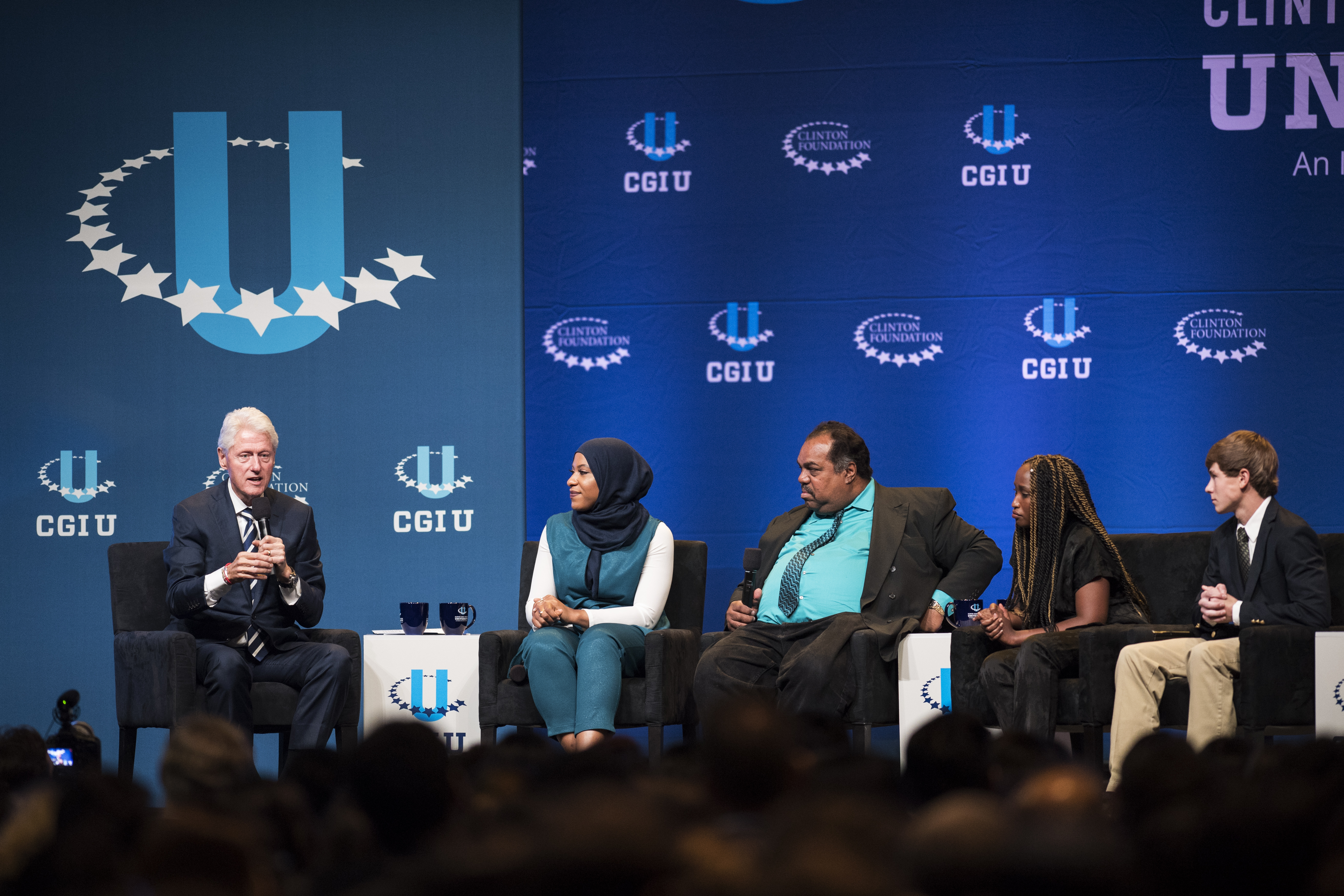Students urged to ‘serve,’ ‘uplift,’ ‘create’ at kick-off event for Clinton Global Initiative University

When former President Bill Clinton was commander-in-chief, he kept a unique talk piece on a table in the Oval Office: a 3.6 billion-year-old rock plucked from the moon by astronaut Neil Armstrong. During difficult—and frequently tense—conversations with lawmakers, he would often pause and direct their attention to the rock. “That rock is 3.6 billion years old, and we’re all just passing through,” he would tell them. “Life is over in the blink of an eye, and we cannot afford to waste it on being petty and narrow-minded when we have so much to do.”
Clinton recalled this story on Friday night at Northeastern, imparting the words of wisdom to nearly 4,000 people who had convened at Matthews Arena to kick-off the 10th annual Clinton Global Initiative University, including 1,200 students from 90 countries and 250 colleges.
The three-day conference at Northeastern featured seminars, workshops, and panel discussions aimed at cultivating a network of young leaders who are developing innovative solutions to global challenges in five fields: education, environment and climate change, peace and human rights, poverty alleviation, and public health. “The most important things in life,” Clinton told the young changemakers, “are liberty and love and the opportunity to give something to someone else.”
In his opening remarks, Northeastern President Joseph E. Aoun extolled the virtues of the students, saying that they “represent the promise of a new generation, the power of a global community, and the hope of our shared dreams.” He added: “You have a passion to make tomorrow better than today. That passion to serve, to uplift, and to create is perhaps more powerful than you realize.”

Nearly 4,000 people attended the opening plenary session of CGI U 2017. Photo by Adam Glanzman/Northeastern University
As the author of the new book Robot Proof: Higher Education in the Age of Artificial Intelligence, Aoun challenged the students to excel in our technology-driven future by nurturing and honing the qualities and attributes that make us uniquely human. He noted that students’ CGIU commitments to solving the world’s biggest challenges—from mentoring refugee children displaced through war to stemming the nation’s opioid crisis—could never be accomplished by machines. “I have never heard of a robot that felt the desire to support a child in need,” he explained. “I have never heard of an algorithm that was compelled to combat drug abuse.”
His charge to CGIU students on Friday night reflected Clinton’s directive to Northeastern students in a 2001 speech at Matthews Arena, when he told them that solving the world’s problems “is about addition and multiplication, not subtraction and division.” “The commitment you’re making and the problems you’re tackling cannot be solved in siloes,” Aoun said. “They cannot be addressed by individuals acting alone. We live in a global community that is connected by the free flow of ideas and by people working together. That interconnection unites us.”
Chelsea Clinton—the vice chair of the Clinton Foundation and the daughter of the 42nd president of the United States—urged the students to be the change they want to see in the world. “Changing the world for the better isn’t someone else’s business—it’s up to us,” she said. “You are all bound together by a shared sense of optimism—otherwise you wouldn’t be here.”

Chelsea Clinton, the vice chair of the Clinton Foundation, urged students to be the change they want to see in the world. Photo by Adam Glanzman/Northeastern University
She pointed to a few groups of CGI U students that are effecting positive change around the world by engineering solutions to specific problems, including a trio from the Massachusetts Institute of Technology that created a warm, easy-to-carry blanket for refugees in Greece. “We must do what we can to advance progress and protect progress,” she said, noting that Northeastern itself has a long and distinguished history of making the world a more equitable place. “That arguably matters more now than ever before.”
‘Role models for all of us’
Clinton’s sentiments reflected the personal philosophies of four diverse and awe-inspiring people who shared their stories with the former president on Friday night as part of CGI U’s opening plenary session. One panelist—Daryl Davis, an African American musician, author, and actor—spent years reaching across a vast racial divide to form unlikely friendships with more than 20 members of the Ku Klux Klan. Another—Thomas Edwards, a high school student from Texas—helped rescue 50 people during Hurricane Harvey. A third—Ibtihaj Muhammad, a Muslim-American sabre fencer—was the first woman to wear a hijab while competing for the U.S. in the Olympics. And the fourth—Sandra Uwiringiyimana, a human rights activist—is the co-founder of the Jimbere Fund, a nonprofit fighting poverty in the Democratic Republic of the Congo.
Clinton, who called the panelists “role models for all of us,” asked each of them several pointed questions. He asked Davis, a blues musician who has played with Clinton, Bruce Hornsby, and Chuck Berry, how he ended up writing Klan-Destine Relationships: A Black Man’s Odyssey in the Ku Klux Klan. In response, Davis described how his initial encounter with racism as a 12-year-old Cub Scout compelled him to seek out KKK members to understand “how you can hate me if you don’t even know me.” “Ignorance breeds fear, and we fear things we don’t understand,” Davis said, explaining why he reached out to the extremist group. “If you don’t keep that fear in check, that fear will in turn breed hatred. And if you don’t keep hatred in check, that hatred will in turn breed destruction.”
He underscored the value of collaborating across cultures, races, and religions to solve some of society’s most pressing problems. But he wondered why it’s so easy for us to communicate with friends on the other side of the world via email when it’s so hard to say “hi” to our neighbors who might look or sound or act different from the way we do. “We need our ideology to catch up to our technology,” he said.

From left to right: Bill Clinton, Ibtihaj Muhammad, Daryl Davis, Sandra Uwiringiyimana, and Thomas Edwards. Photo by Adam Glanzman/Northeastern University
Clinton asked Muhammad to explain how she views her obligation to society. Muhammad—who has competed in more than two-dozen countries as part of the U.S. fencing team—believed that her status as a Muslim-American Olympian provided her a unique platform to expand the public’s understanding of the world’s Muslim community. “My goal in life is to share my story and to provide inspiration for those who have been told they don’t belong,” she explained. “It’s hard for a lot of people to wrap their mind around a Muslim woman in sport,” she said. “But I had the opportunity to show people a different view of Islam at the height of the presidential election, when the Muslim community was under the microscope.”
Toward the end of the two-hour event, Clinton asked Edwards if his display of bravery in the face of Hurricane Harvey had changed him in any fundamental way. Edwards—who rescued two workers whose dump truck had begun to fill with floodwater as well as dozens of other people who were stranded in his Houston neighborhood—noted that the experience had enhanced his appreciation of life’s simpler things. “Material things don’t matter,” he said, explaining that it was no big deal that he lost his truck to Harvey. For him and his friends, who executed their rescue mission in a small fishing boat, picking up complete strangers and driving them to safety was simply the right thing to do. They broke the tension by cracking jokes, lightening the mood in dark times. “They laughed and we laughed and we saved a lot of people,” he said. “Having a simple conversation can really open up your mind.”
Uwiringiyimana, for her part, explained how the Jimbere Fund is working to provide access to critical services, create jobs, and lift people out of poverty in a sustainable way. “If people have more opportunities,” she said, “there would be less to fight about.” To her, we all need to be willing to be changemakers. As she put it, “There’s a lot of work to be done and we’re all capable of changing the world we live in, but we cannot wait for somebody else to start that conversation.”





